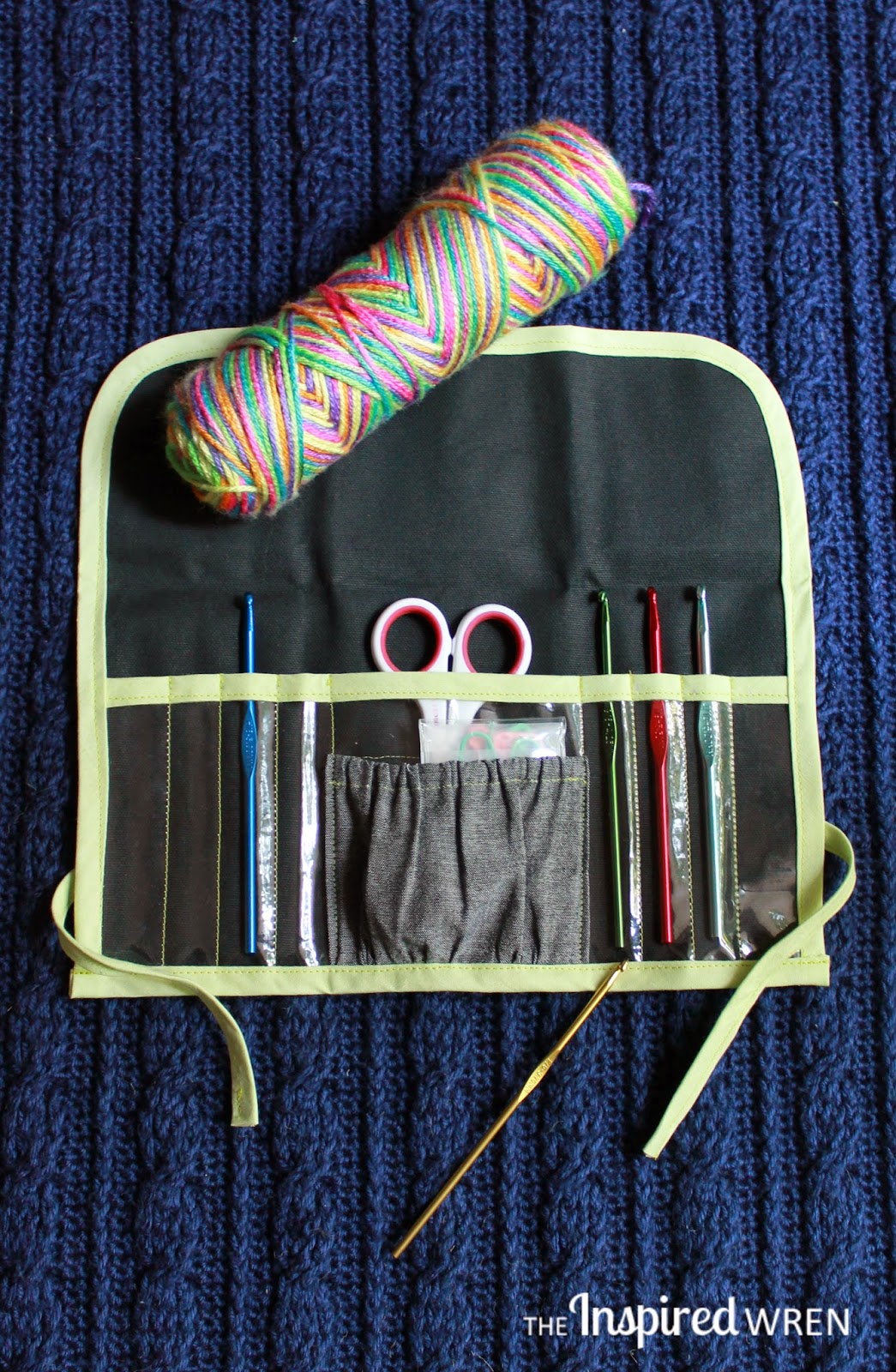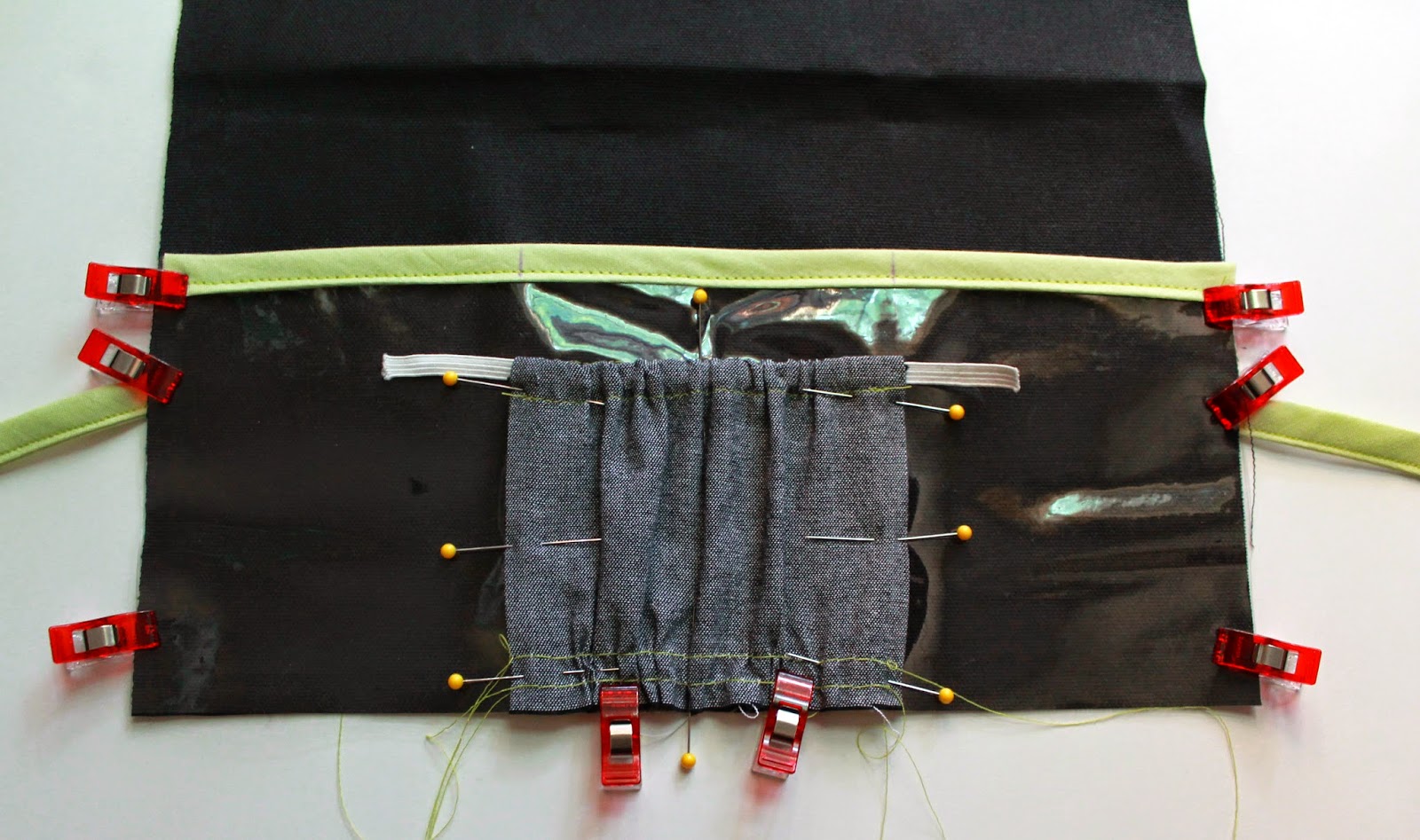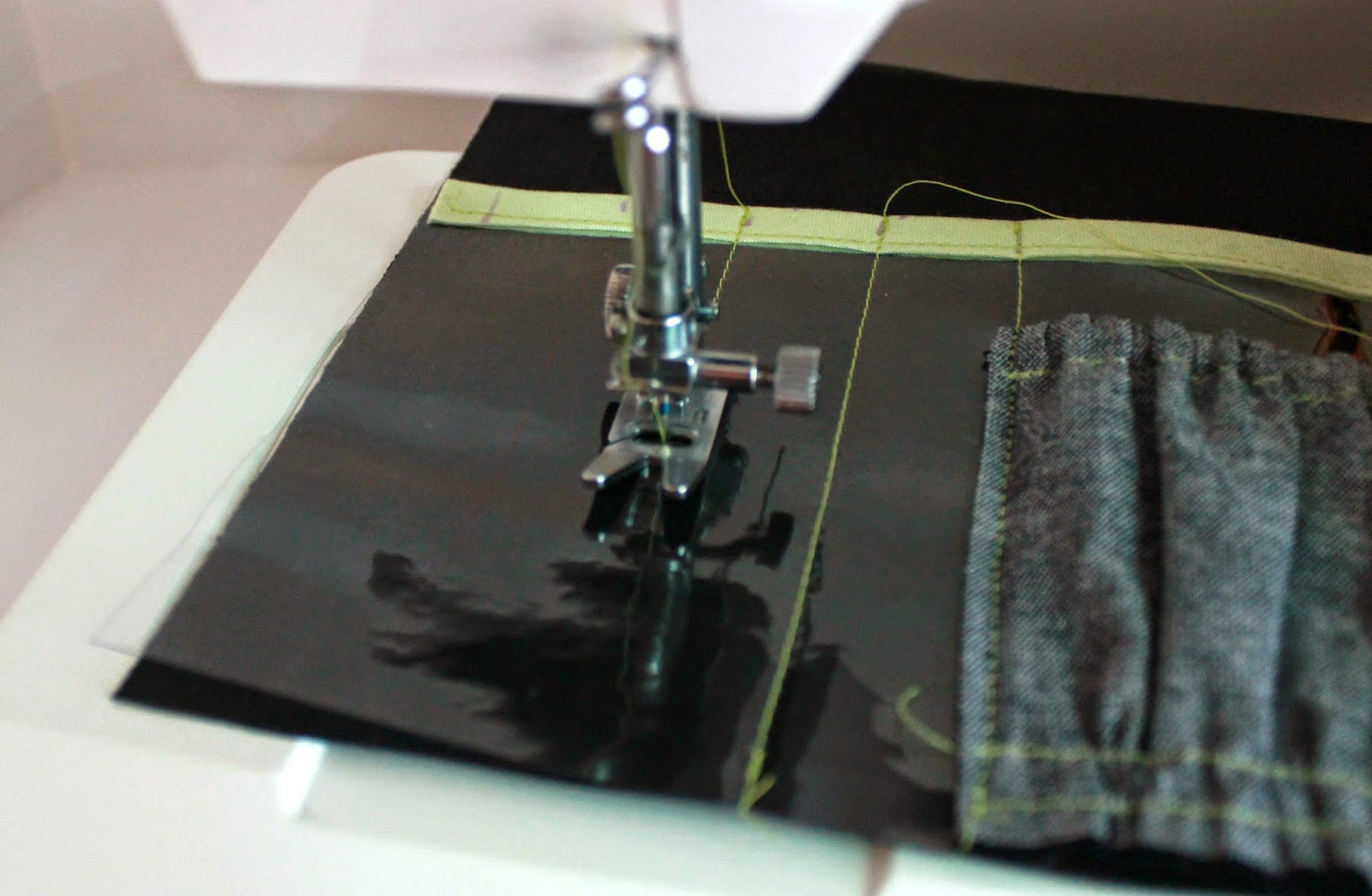I loved my previous crochet hook case. I loved it because it was crocheted for me by my kid sister. I loved that I could see at a glance the size printed on each hook. I loved that it had a center pocket for other crochet tools (scissors, tape measure, and the like). And I loved that it matched my project basket. But I also hated my previous crochet hook case. The hooks fell out of it so easily that it barely did its job. (Sorry, Kid.) I decided it was time to replace it. I wanted a new case about the same size as the old case; a case that would contain the hooks in a way I could still see the sizes and also have space for the other tools. I solved my problem by sewing my own case out of canvas and clear vinyl, and now you can, too.
This post contains affiliate links. That means if you click it and buy it, I'll make a teeny, tiny percentage of the purchase price at no additional cost to you. And just to be sure you only click what you want to click, all those links are clearly marked.
If you’re like me and prefer to print out the tutorials you use, download the 4-page PDF version here for just $1.99! Otherwise, read on for step-by-step directions how to sew a Cear-View Crochet Hook Case from vinyl and duck cloth, including full cutting dimensions so there's no guess work.
MATERIALS
- Clear 16 Gauge Vinyl*
- Duck Cloth (Heavy Canvas)* If you want use a lighter weight fabric, like quilting cotton, I would suggest two layers with a medium-weight interfacing in between. The raw edges of the final case are all bias bound so you can simply create a fabric-interfacing-fabric sandwich, then baste the edges and treat it like the single piece of duck cloth.
- Light Accent Fabric* Quilting weight cotton is perfect here and you really only need a scrap.
- Accent/coordinating ½″ double fold bias tape, approximately 84″ or just under 2 ½ yards (less than one package)
- ¼″ Elastic, approximately 7 ½″ long
- Coordinating thread and heavy-duty needle
*See Cutting for the amount of materials needed. I was able to use large scraps from previous projects. My favorite source of vinyl is the remnant bin at my local fabric store.
CUTTING
NOTE: Pins will leave permanent holes in vinyl. When working with the vinyl use clips instead—Wonder Clips, clothes pins, binder clips will all work. In the past I’ve used a collection of clippy, clothespin-like things we acquired attached to grocery store Mylar balloons. If you use a pin be sure it goes through areas of the vinyl that will remain covered with fabric—but use them sparingly as every hole is a potential
tear point.
The dimensions listed here will create a final Case 12″ wide x 11″ tall when open. You can easily change these dimensions to fit your need; keep in mind that a ½″ seam-allowance is subtracted from the edges for the bias binding.
Vinyl
Clear Pocket: 12″ x 5″; cut 1
NOTE: You can use a ball-point pen to mark the vinyl. I used black in this example and it doesn’t sow under the stitching against the black canvas. Test your marking tools and use your best judgment.
Duck Cloth (Heavy Canvas)
Case: 12″ x 11″; cut 1
Light Accent Fabric
Gathered Pocket: 6 ½″ x 4 ½″; cut 1
2. Working on the side that will become the outside of the Case, mark a 4″-long line parallel to and 3 ½″ up from the bottom edge, centered (4″ in from each side).
Duck Cloth (Heavy Canvas)
Case: 12″ x 11″; cut 1
Light Accent Fabric
Gathered Pocket: 6 ½″ x 4 ½″; cut 1
CONSTRUCTION
PREPARE THE CASE
1. To prepare the Case, round the top two corners on the duck cloth/canvas (the 12″ edge). I traced a standard 16 oz. Solo cup on one corner then folded the canvas in half and cut both corners together for symmetry.
2. Working on the side that will become the outside of the Case, mark a 4″-long line parallel to and 3 ½″ up from the bottom edge, centered (4″ in from each side).
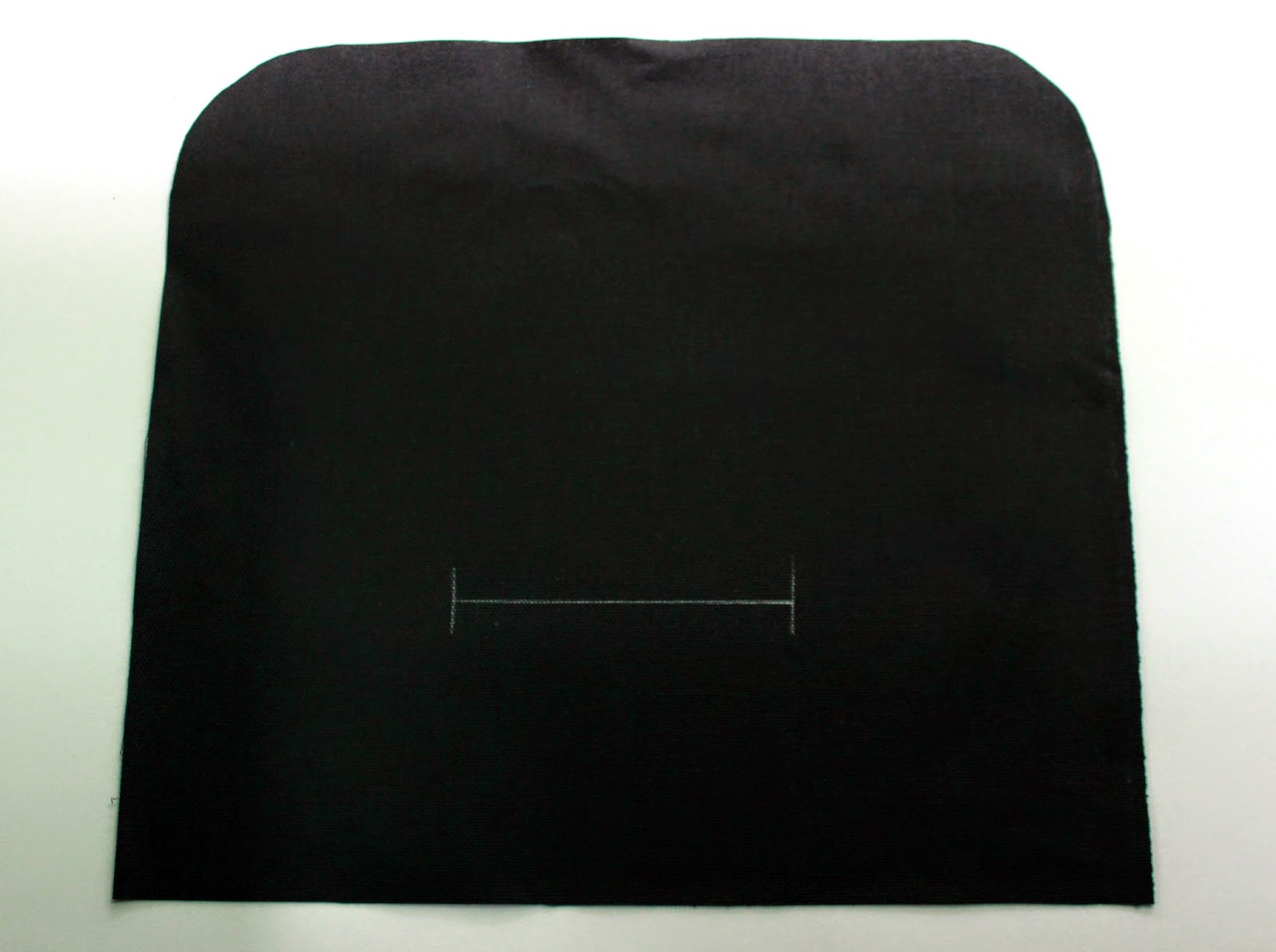 |
| Step 2: Mark a 4"-long line, 3 1/2" up from the bottom edge. |
ATTACH THE WRAP CLOSURE
3. Cut a length of bias tape 26″ long. Unfold the tape at one end and fold back the raw edge ¼″, refold encasing the raw edge. Repeat on the other end. Edge stitch the full length of the tape, closing the open side to create the Wrap Closure.
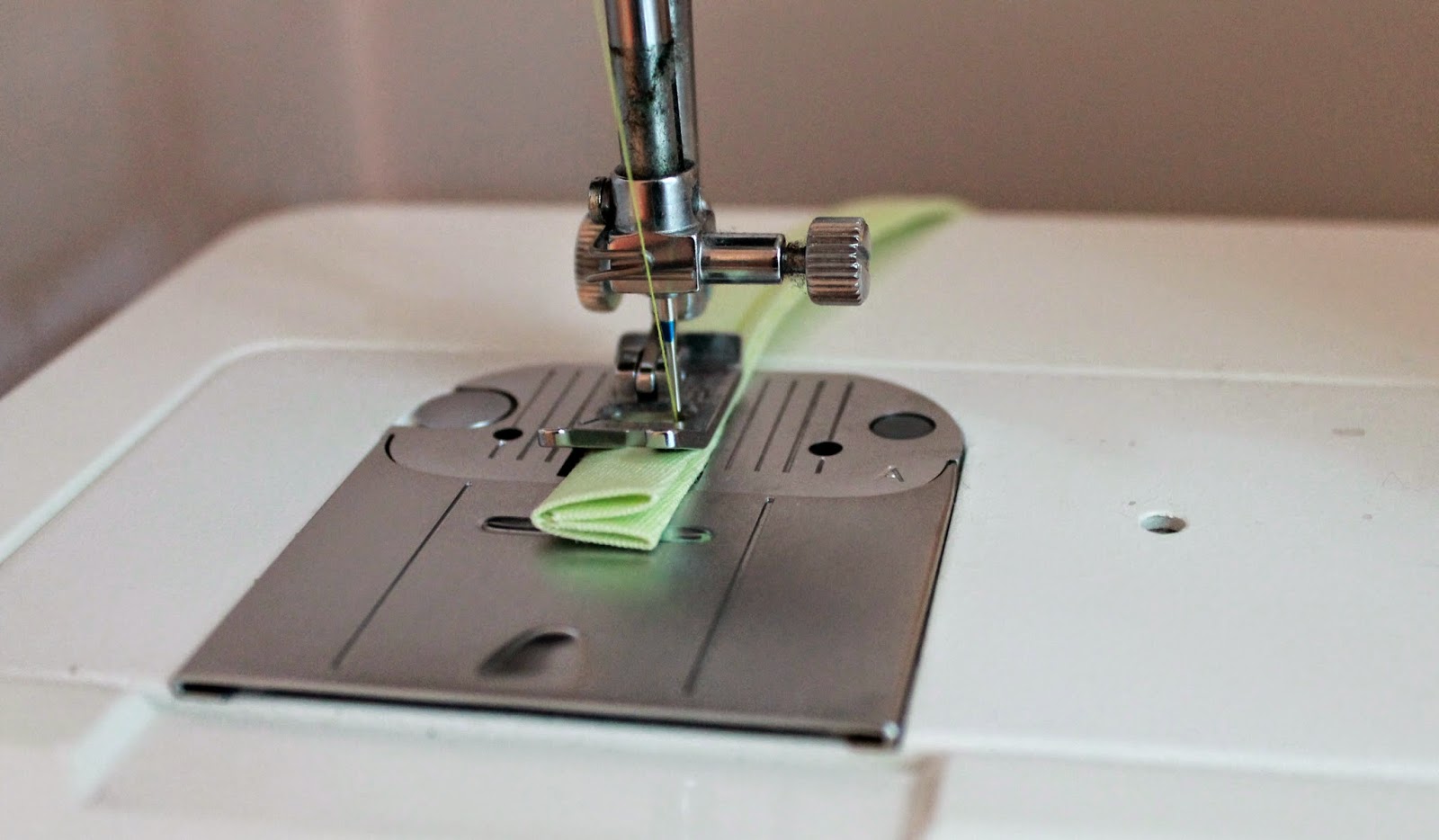 |
| Step 3: Edge stitch the bias tape closed. |
4. Center the Wrap Closure on the outside of the Case, aligned with the 4″ line of Step 2. Sew the handle in place along the 4″ line only; top-stitch a rectangle on the handle within the 4″.
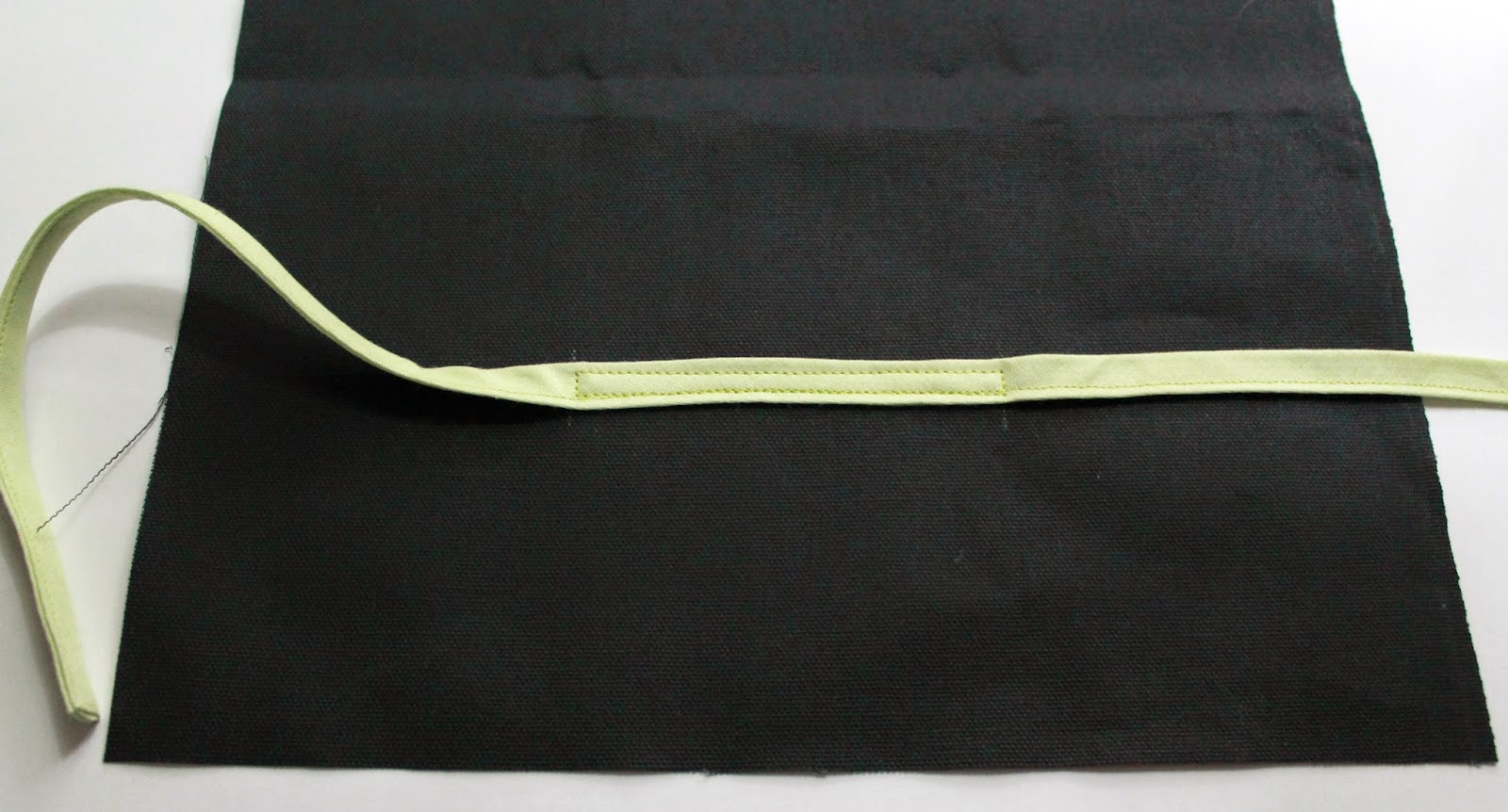 |
| Step 4: Sew the Wrap Closure onto the outside of the case. |
PREPARE THE POCKETS
NOTE: When sewing vinyl, each hole the needle pierces becomes a potential tear point. For this reason you’ll want to sew over each seam only once, and with a long (greater than 3) stitch. When attaching bias tape do NOT properly sew one open-, inside-edge of the bias tape along the seam before folding the bias tape over the seam-allowance and top-stitching. No. Just slap the bias tape on there, clip it in place, and top-stitch (with a long stitch) from the get-go.
5. Sew bias tape to the top (12″ edge) of the Clear Pocket vinyl. Trim the bias tape to the same width as the panel, and leave the ends unfinished. Do NOT press to set your stitches, even if that’s your habit; vinyl melts.
 |
| Step 5: Sew bias tape to the top of the vinyl pocket. |
6. Pin/clip the Clear Pocket to the inside of the Case (opposite side from the Wrap Closure), aligning the bottom edges and the sides. Mark stitch lines for the center pocket parallel to and 4″ in from the sides. Set aside.
7. Prepare the Gathered Pocket by pressing each side in by ¼″. Press the top down ¼″, then down ¼″ again.
8. With the sides still pressed in, run a gathering/basting stitch across the bottom edge of the Gathered Pocket.
9. Open the top folded edge of the Gathered Pocket, with the sides still pressed in, center the elastic on the opened edge and stitch it in place at the center mark. Fold the top down again, encasing the elastic. Sew the top hem closed, avoid stitching into the elastic. The raw edges of the elastic should hang out the sides of the hem at this point.
 |
| Step 9a: Stitch the elastic at the center of the open hem on the Gathered Pocket. |
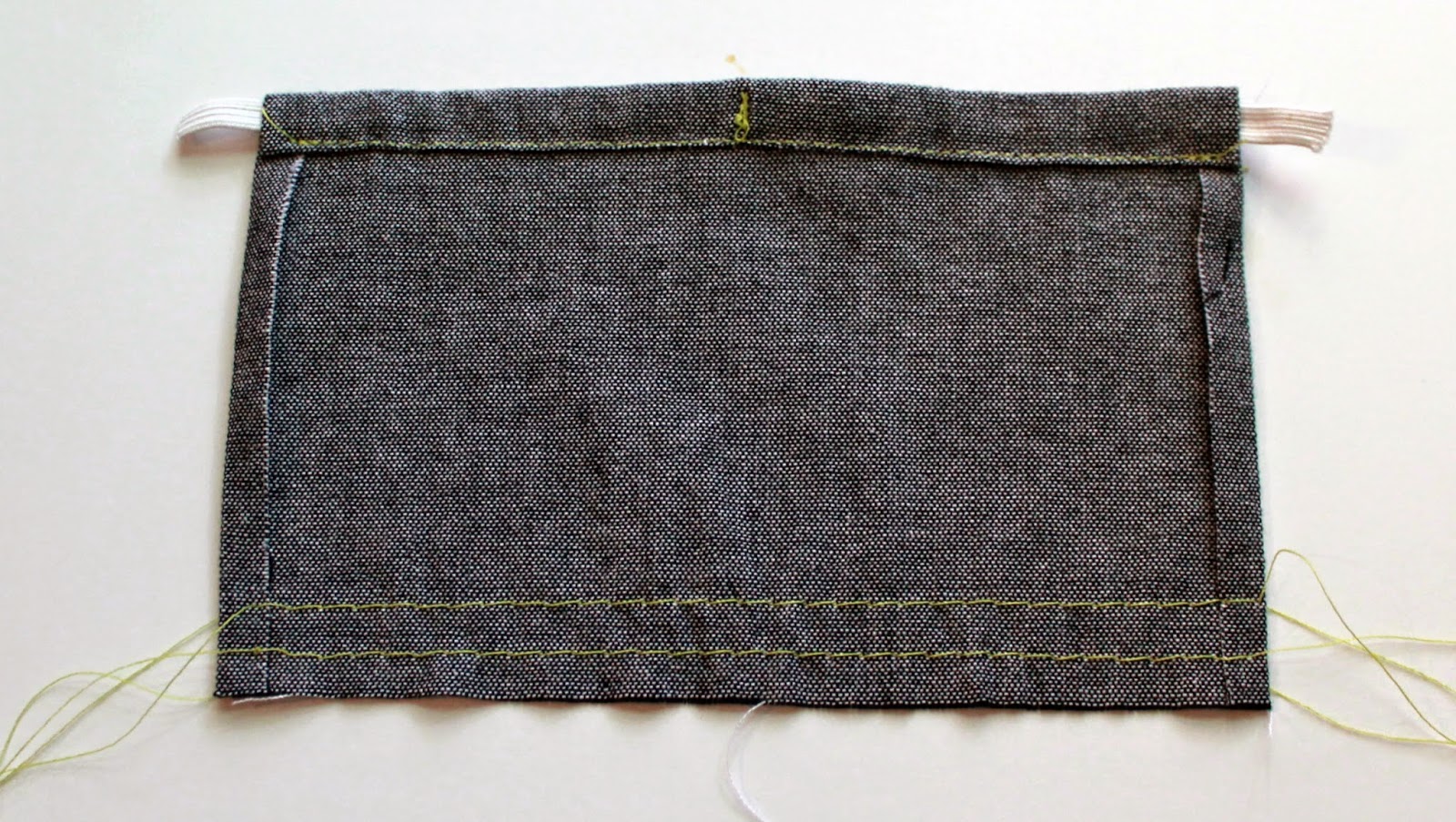 |
| Step 9b: Fold the top hem of the Gathered Pocket closed and stitch. |
10. Align the bottom, raw edge of the Gathered Pocket with the bottom, raw edges of the Clear Pocket and the Case. Pin the Gathered Pocket centered on the Case; mark the center of the Case and the center of the Gathered Pocket to best align them.
11. Gather the bottom edge of the Gathered Pocket until the sides of the pocket align with the stitch lines of Step 6; gather the top of the pocket by pulling on the elastic. Pin the edges in place.
12. Using a long (greater than 3) stitch, sew from the bias-bound top of the Clear Pocket, down along a marked stitch line, catching the sides of the pocket as you sew; gently stretch the elastic out (but not the gathers) as you stitch over it. Be sure to lock-stitch or back-stitch at the beginning and end of each line. It is okay to stitch over the loose Wrap Closure on the opposite side as long as it is still horizontally in place. Repeat on the other stitch line/side of the pocket. (You do not need to sew the bottom edge of the pocket at this time.)
13. Trim the edges of the elastic by pulling it taught and cutting it at the edge of the Gathered Pocket; once cut it will retreat back under the edge of the fabric.
FINISH THE CASE
14. Measure out from the stitch lines of the Gathered Pocket, mark three additional stitch lines on each side, spaced every ⅞″, for a total of six lines. Keeping the loose ties of the Wrap Closure on the opposite side out of the way so as not to sew through them, stitch from the bias-bound top of the Clear Pocket down each marked line. Be sure to lock-stitch or back stitch at the beginning and end of each line.
15. Beginning at one bottom edge corner, sew bias tape up one side, around the top, and back down the opposite side. Trim the bias tape flush with the bottom, raw edge of the Case on both sides.
16. Finish the bottom edge of the Case and Pockets by sewing bias tape in place; extend the edge of the tape out approximately ½″ beyond each side, unfold the tape and fold the raw edge over the case and back into itself, then refold. Carefully sew the bias tape in place closing the bottom edge as you do so.
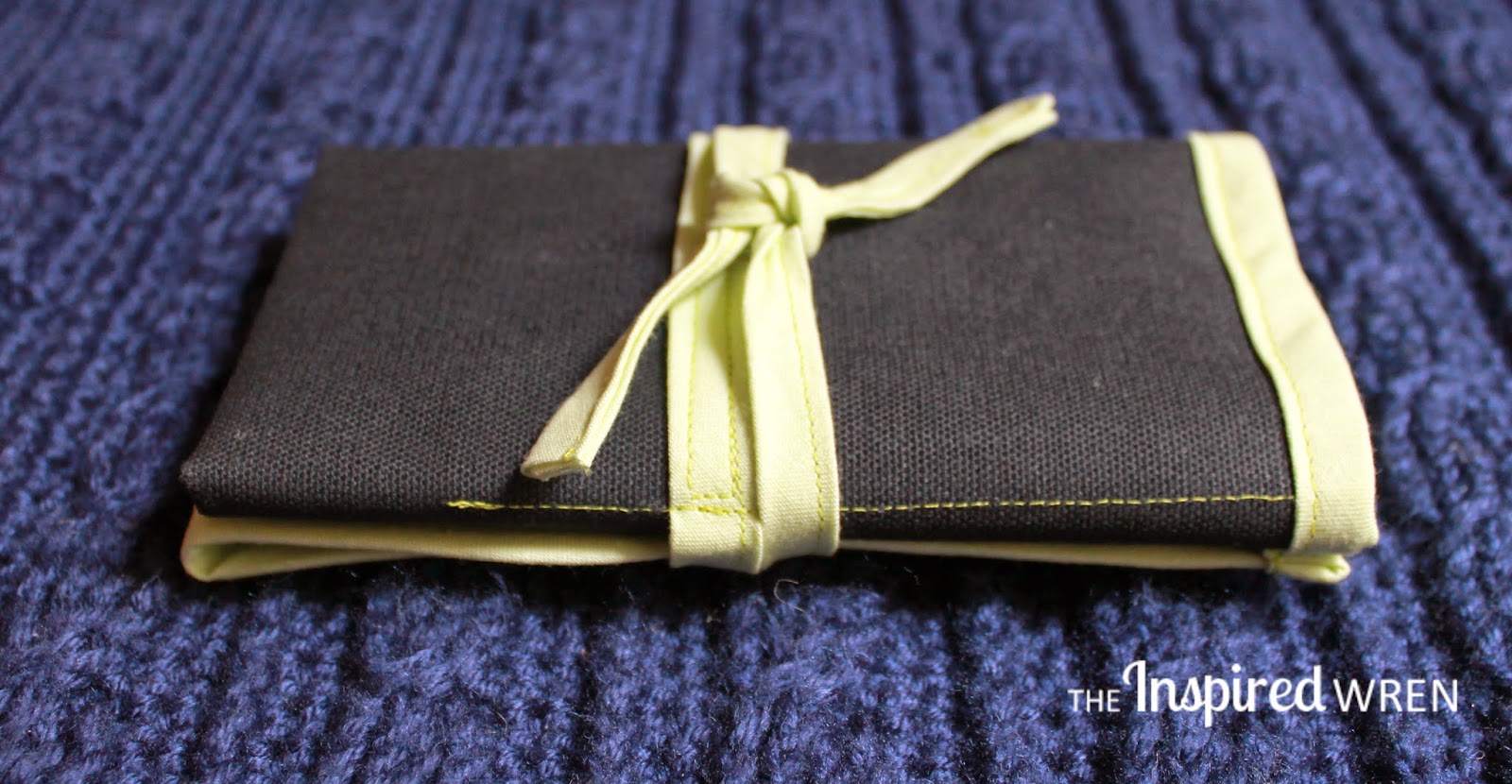 |
| The final case folds cleanly and keeps all the crochet tools and hooks securely in place. |
YOU'RE DONE!
This a great case for keeping your crochet hooks and tools secure in one place. I love the ease at which I can see the size of each hook, and that they no longer fall out and into the bottom of my project basket. This case can easily be adapted to hold more hooks, or made taller for knitting needles.
If you use this tutorial, I’d love to see and hear about your results. Come share your projects on The Inspired Wren Share page. There you can link up your images from a blog, Flickr, Pinterest, or Instagram.
PS -- Thanks for reading to the end. Of course, now you need a bag to put your new Crochet Hook Case in! Try the 3-10 Tote or the Lined Canvas Tote sewn in coordinating fabric. The Vinyl Lunch Bag also doubles as a great project bag to fit inside a larger tote. ~Ren

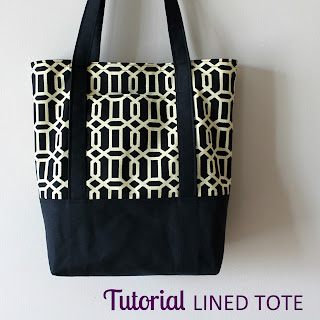




Ren Murphy writes for The Inspired Wren.
___________________________________________________
You should really see all that goes into each project!
Daily updates on Instagram (and Flickr) of works-in-progress will give you that behind the scenes view you’re looking for, and sneak peeks of First Tuesday Tutorials, too.
___________________________________________________
The Inspired Wren is a participant in the Amazon Services LLC Associates Program, an affiliate advertising program designed to provide a means for sites to earn advertising fees by advertising and linking to amazon.com.

